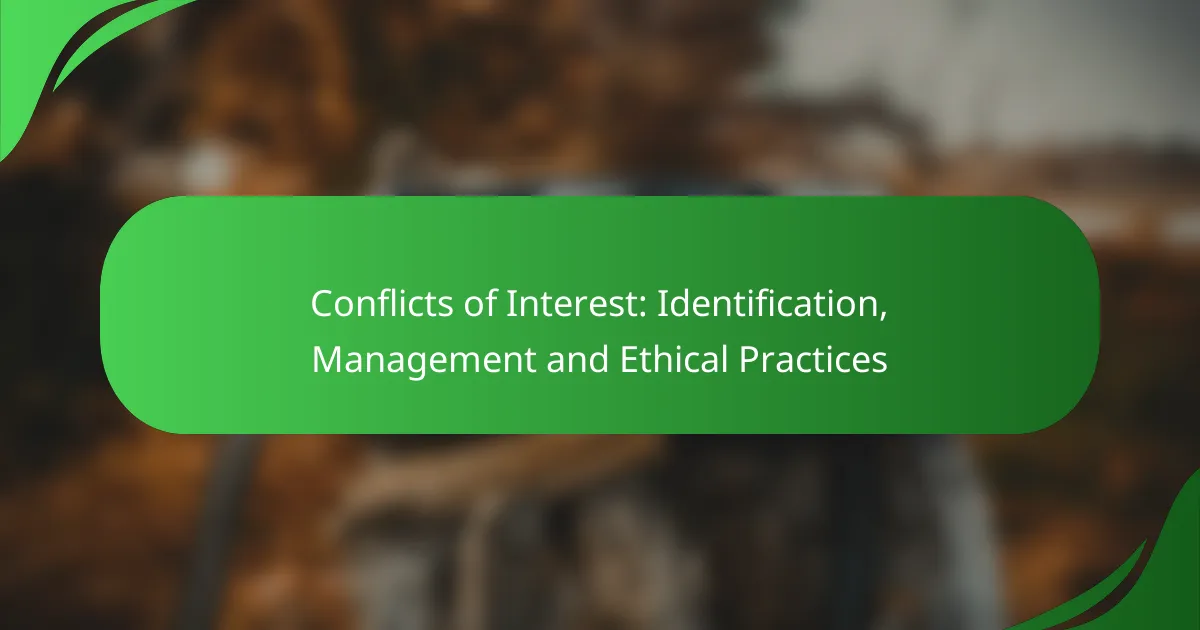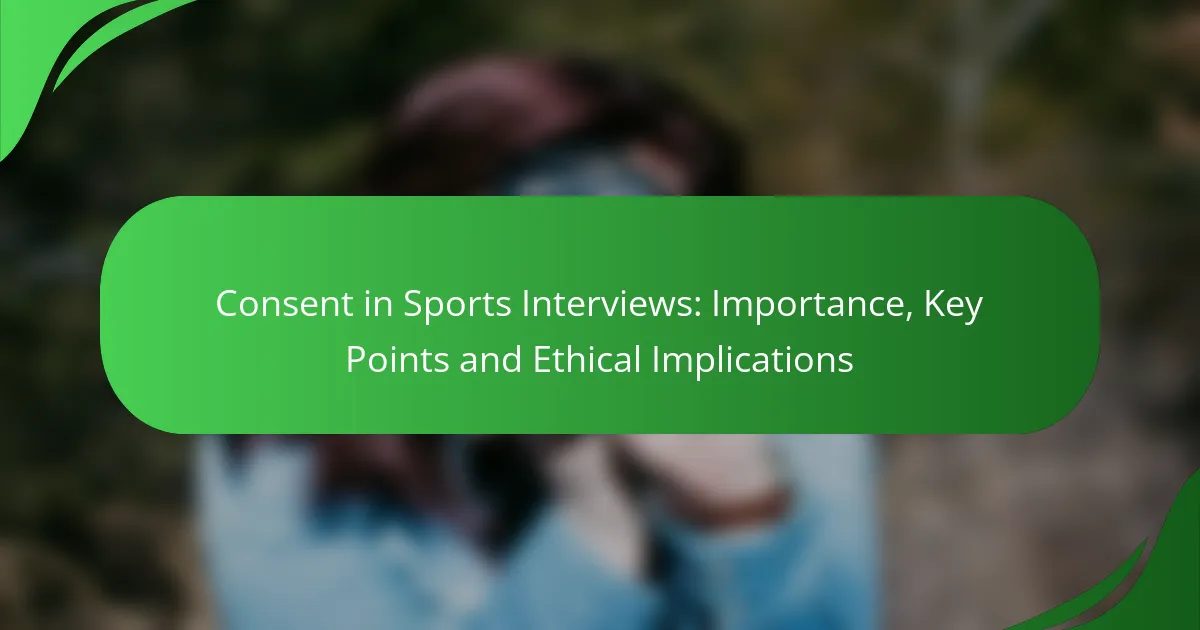Addressing sensitive topics in interviews requires a thoughtful and ethical approach that prioritizes the interviewee’s comfort and well-being. By fostering a safe environment and employing effective communication techniques, interviewers can facilitate open dialogue and build trust. Best practices include respecting boundaries and providing support resources, ensuring a respectful and constructive conversation.

How to ethically approach sensitive topics in interviews?
Ethically approaching sensitive topics in interviews involves being respectful, aware of cultural nuances, and prioritizing the well-being of interviewees. This means creating a safe environment where individuals feel comfortable sharing their experiences without fear of judgment or harm.
Understanding cultural sensitivity
Cultural sensitivity is crucial when discussing sensitive topics, as it acknowledges the diverse backgrounds and experiences of interviewees. Recognizing cultural differences can help prevent misunderstandings and foster a respectful dialogue.
To practice cultural sensitivity, research the cultural context of your interviewee. This may include understanding their values, beliefs, and communication styles. For example, some cultures may prioritize indirect communication, while others may value directness.
Establishing trust with interviewees
Building trust is essential for encouraging open and honest communication during sensitive interviews. Trust can be established by demonstrating empathy, active listening, and maintaining confidentiality.
Start by introducing yourself and explaining the purpose of the interview. Be transparent about how the information will be used and reassure interviewees that their privacy will be respected. Simple gestures, like maintaining eye contact and using a warm tone, can also help create a trusting atmosphere.
Using trauma-informed care principles
Applying trauma-informed care principles in interviews means recognizing the potential impact of trauma on individuals and adjusting your approach accordingly. This involves being aware of triggers and creating a supportive environment that prioritizes safety and empowerment.
Key principles include ensuring physical and emotional safety, offering choices to the interviewee, and promoting collaboration. For instance, allow interviewees to dictate the pace of the conversation and give them the option to skip questions that may be too distressing.
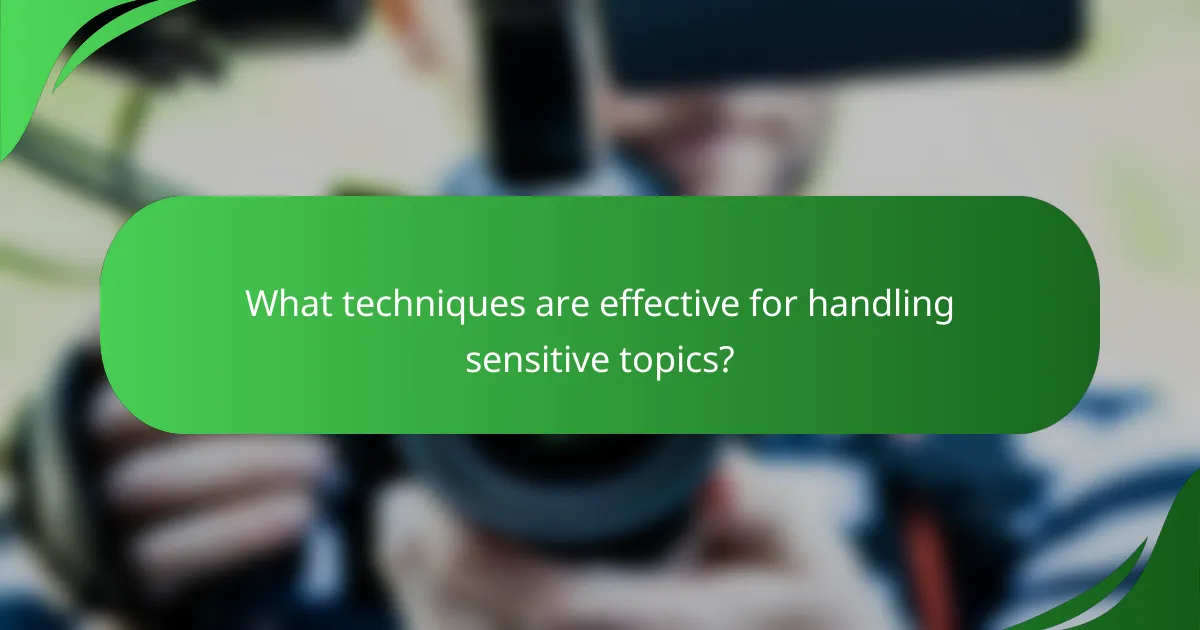
What techniques are effective for handling sensitive topics?
Effective techniques for handling sensitive topics include active listening, non-verbal communication, and creating a safe interview environment. These approaches help build trust and facilitate open dialogue, making it easier to discuss challenging subjects.
Active listening strategies
Active listening involves fully concentrating on the speaker, understanding their message, and responding thoughtfully. Techniques such as paraphrasing what the speaker has said or asking clarifying questions can demonstrate engagement and empathy.
To enhance active listening, maintain eye contact and nod occasionally to show understanding. Avoid interrupting the speaker, as this can discourage them from sharing their thoughts openly.
Non-verbal communication cues
Non-verbal communication cues, such as facial expressions, posture, and gestures, play a crucial role in conveying empathy and understanding. Positive body language, like leaning slightly forward or maintaining an open posture, can signal to the speaker that you are receptive to their feelings.
Be mindful of your own non-verbal signals, as they can either reinforce or contradict your verbal messages. For instance, crossing your arms may appear defensive, while a relaxed stance can foster a more inviting atmosphere.
Creating a safe interview environment
Creating a safe interview environment is essential for discussing sensitive topics. This can be achieved by choosing a private, comfortable setting where the interviewee feels secure and respected. Ensure that the space is free from distractions and interruptions.
Establishing ground rules at the beginning of the conversation can also help. Clearly communicate confidentiality and the purpose of the discussion to reassure the interviewee that their thoughts and feelings will be treated with care and respect.

What are best practices for interviewing on sensitive topics?
Best practices for interviewing on sensitive topics involve careful preparation, respect for the interviewee’s boundaries, and providing support resources afterward. These approaches help create a safe environment that encourages open and honest dialogue while minimizing potential distress.
Preparing thoughtful questions
Crafting thoughtful questions is essential when discussing sensitive topics. Focus on open-ended inquiries that allow interviewees to share their experiences without feeling pressured. For example, instead of asking, “Did you feel sad?” consider, “Can you describe how you felt during that time?”
Additionally, anticipate possible emotional triggers and prepare follow-up questions that demonstrate empathy and understanding. This approach not only shows respect but also fosters a more meaningful conversation.
Respecting boundaries of interviewees
Respecting the boundaries of interviewees is crucial in sensitive interviews. Always ask for permission before delving into personal topics and be attentive to non-verbal cues that may indicate discomfort. If an interviewee seems hesitant, gently shift the conversation to a less sensitive area.
Establishing a clear understanding of what topics are off-limits can help maintain trust. Consider discussing boundaries at the beginning of the interview to ensure both parties are comfortable with the conversation flow.
Following up with support resources
After discussing sensitive topics, it’s important to follow up with support resources. Provide information about counseling services, hotlines, or community organizations that can offer assistance. This shows that you care about the interviewee’s well-being beyond the interview itself.
Additionally, consider sending a thank-you note that includes these resources. This gesture reinforces your commitment to their mental health and encourages them to seek help if needed.

What frameworks guide ethical interviewing practices?
Ethical interviewing practices are guided by established frameworks that prioritize respect, integrity, and the well-being of interview subjects. These frameworks help ensure that interviews are conducted fairly and sensitively, particularly when dealing with vulnerable populations.
Ethical guidelines from the British Psychological Society
The British Psychological Society (BPS) provides ethical guidelines that emphasize the importance of informed consent, confidentiality, and the right to withdraw from an interview at any time. Interviewers should ensure that participants fully understand the purpose of the interview and how their data will be used.
Additionally, the BPS encourages interviewers to be aware of their own biases and to approach sensitive topics with care. This includes being prepared for emotional responses and having strategies in place to support participants if needed.
Frameworks from the National Health Service
The National Health Service (NHS) outlines frameworks that focus on safeguarding the dignity and rights of individuals during interviews. This includes adherence to principles such as respect for autonomy and non-maleficence, which means avoiding harm to participants.
Interviewers in the NHS context are trained to create a safe environment where individuals feel comfortable sharing their experiences. This involves using appropriate language, being empathetic, and actively listening to participants. Regular training and supervision are recommended to maintain high ethical standards.
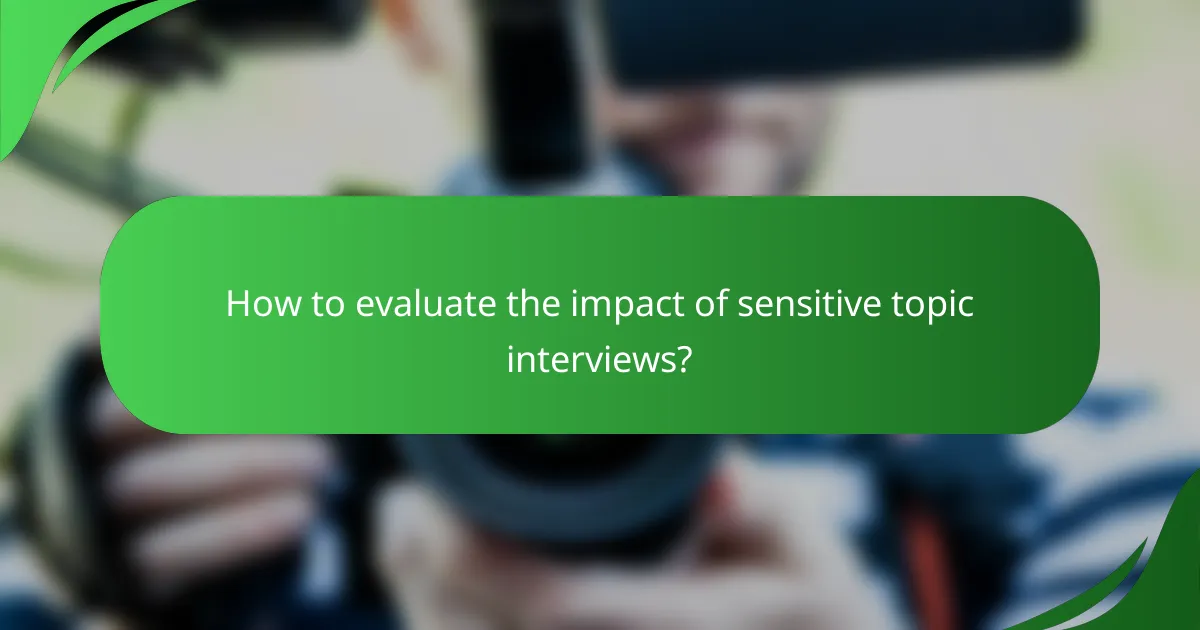
How to evaluate the impact of sensitive topic interviews?
Evaluating the impact of sensitive topic interviews involves analyzing audience engagement and emotional responses. These metrics help determine how effectively the interview resonates with viewers and the potential consequences on their feelings and perceptions.
Measuring audience engagement
To measure audience engagement, consider metrics such as view counts, social media shares, and comments. High engagement often indicates that the content resonates with viewers, while low engagement may suggest a need for reevaluation of the topic or presentation style.
Utilizing tools like Google Analytics can provide insights into viewer behavior, such as average watch time and drop-off rates. Aim for an average watch time of at least a few minutes to ensure that the audience is genuinely interested in the content.
Assessing emotional responses
Assessing emotional responses can be done through surveys or feedback forms that ask viewers about their feelings after watching the interview. Questions should focus on how the content made them feel, whether it prompted reflection, or if it led to a desire for further discussion.
Consider using qualitative methods, such as focus groups, to gather deeper insights into emotional reactions. Look for common themes in responses, as these can guide future interviews and help tailor content to better meet audience needs.
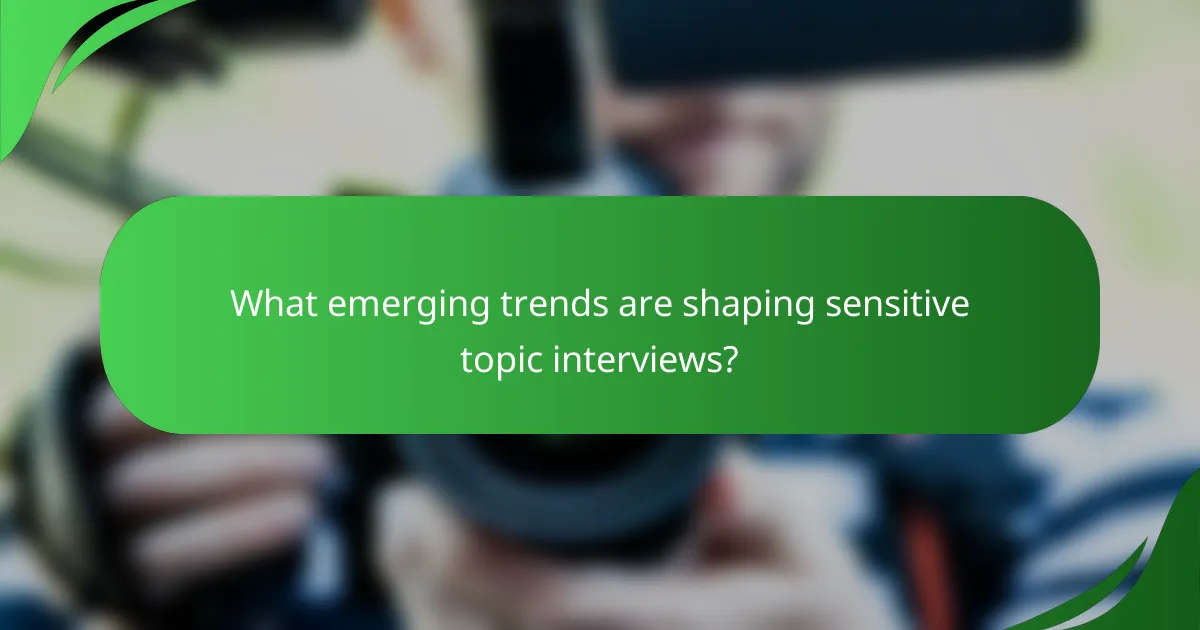
What emerging trends are shaping sensitive topic interviews?
Emerging trends in sensitive topic interviews focus on utilizing technology and adapting to changing societal attitudes. These trends enhance the interviewer’s ability to approach delicate subjects with care and respect, ultimately leading to more meaningful conversations.
Incorporating digital tools for sensitivity
Digital tools such as video conferencing platforms and specialized software for recording interviews are increasingly used to handle sensitive topics. These technologies allow for remote interviews, which can create a more comfortable environment for interviewees.
Additionally, tools that provide real-time transcription and sentiment analysis can help interviewers gauge emotional responses and adjust their approach accordingly. For instance, using software that highlights stress indicators can prompt interviewers to shift topics or offer support.
Shifts in public perception and awareness
Public perception around sensitive topics has evolved significantly, leading to greater awareness and openness in discussions. Issues like mental health, trauma, and social justice are now more widely recognized, prompting interviewers to approach these subjects with increased empathy and understanding.
As societal norms shift, interviewers must stay informed about current language and terminology to avoid causing offense. For example, using person-first language, such as “person with a disability” instead of “disabled person,” reflects a more respectful approach that aligns with contemporary values.


